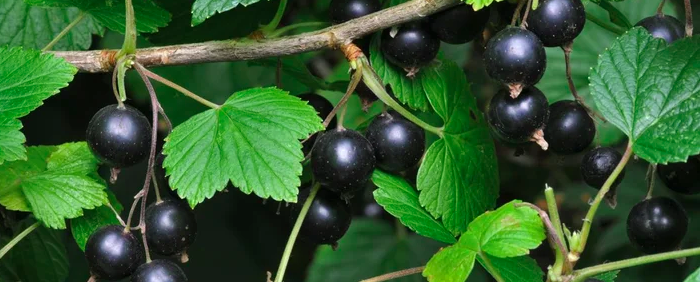
Nutritional value of blackcurrant
| Per 100 g | |
| Calories | 64 kcal |
| Water | 82g |
| Carbohydrates | 15g |
| Protein | 1.4 g |
| Fat | 0.4 g |
| Dietary fiber | 5.4 g |
| Vitamin C | 181 mg |
| Potassium | 322 mg |
Health effects of black currant
Vitamin C / Antioxidants
Black currants are an excellent source of vitamin C. In fact, 1 cup of fresh black currants contains three times more vitamin C than a small orange. In addition to its antioxidant role, vitamin C contributes to the maintenance of skin integrity, helps wound healing, protects cells from premature aging caused by free radicals and facilitates immune functions. In addition, it facilitates the absorption of non-heme iron of plant origin.
These berries are also rich in tannins and flavonoids (anthocyanins) which have a strong antioxidant potential.
In addition, black currant seed oil and its leaves have been studied by many scientists. These potentially have an anti-inflammatory role, an anti-coagulant effect and a positive influence on blood cholesterol levels 2 .
Potassium
Black currant is also a good source of potassium. Like sodium, potassium is an essential mineral that performs several necessary functions in the human body. With the help of sodium, it helps maintain the acid-base balance of the body and controls the pH inside cells. It is also essential for the transmission of nerve impulses, for muscle contraction, it participates in the proper functioning of the kidneys and adrenal glands and also in protein synthesis and carbohydrate metabolism.
Pectin
Black currant is a fruit rich in pectin, a type of fiber that has the property of forming a gel by trapping water. The capacity of blackcurrants to make jellies and jams will be more interesting if the fruits are not completely ripe. Pectin would have many health benefits including lowering blood cholesterol levels and blood sugar 3 . Pectin also has the ability to delay gastric emptying and thus promote satiety. It has also been studied in connection with certain types of cancer, notably colon cancer. Finally, it would have the capacity to form a physical barrier protecting the intestinal cells against a microbial infection.
Use of blackcurrant
When buying, you are looking for an intact and well-colored fruit. Black currants are rarely sold fresh as table fruit, however. It is especially sought after for the manufacture of coulis, jelly and jam. It is also eaten liquid, with the crème de cassis used to make kirs or nectar, syrups or liqueurs.
Cooking is done slowly in a small amount of water or juice. It is advisable to add sugar after cooking to reduce the sour taste of these berries. When fresh, they keep for 2 to 3 days in the refrigerator. It is also possible to freeze them whole with or without sugar. It is advisable to wash them only when using them.
A word from the nutritionist
Blackcurrant is a fruit that one gains from consuming often and in all its forms. Its richness in vitamin C and other antioxidant compounds make it a fruit to put in the list of foods with a strong health benefit.